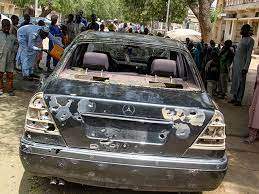Boko Haram, Fulani Jihadists Expand Reach in Nigeria

The Nigerian Islamic terror group Boko Haram and Fulani jihadists belonging to a mainly Muslim ethnic group of Nigerian cattle herders, have expanded their territory in Nigeria in recent months with increased attacks outside of their usual strongholds, local media reported Monday.
“[I]n the latest revelations by state governments, there is an indication that the [Boko Haram] terrorists now operate in other states apart from the troubled North-east,” Nigeria’s Premium Times reported May 17.
“Most of these states such as Nasarawa, Benue and Niger do not share boundaries with the North-east states,” the newspaper noted. Niger state borders Nigeria’s centrally located national capital, Abuja, to the west, while Nasarawa borders Abuja to the east. Benue state is located 120 miles southeast of Abuja.
Nasarawa Gov. Abdullahi Sule revealed during a visit with Nigerian President Muhammadu Buhari in January that “Boko Haram terrorists were now successfully carrying out attacks in his state,” the Premium Times recalled on Monday.
“He [Sule] said the terrorists had regrouped along the Nasarawa/Benue border from where they launched attacks on residents, after they were initially displaced by soldiers from Toto, a local government in the state,” the newspaper reported.
Sule said in January he had confirmed the recent attacks in Nasarawa were carried out by Boko Haram because his state security forces had captured and interrogated some of the terrorists, who admitted they were members of the jihadist group.
“That is how we got our confirmation that they were indeed Boko Haram. They said it themselves,” Sule told reporters January 22.
The Nigerian Army on May 16 said it had arrested “13 Boko Haram suspects” in the Hotoro area of Kano state, located in northern Nigeria. Nigerian Army spokesman Mohammed Yerima said, “The suspects were arrested by troops of the 3 brigade in Kano,” the Premium Times reported Sunday.
“Kano shares boundaries with Jigawa and Bauchi states that have raised concerns on the activities and presence of Boko Haram in their territories,” the newspaper noted.
Boko Haram has been based out of northeastern Nigeria’s Borno State, specifically in and around the state’s Sambisa Forest, since the early 2000s. The jihadist group has waged an Islamist insurgency across northern Nigeria, which is predominantly Muslim, since 2009 by carrying out deadly terror attacks that largely target Nigerian minority Christians in the region. While Boko Haram’s insurgency has spread to other African states neighboring Borno State and the Lake Chad region — including Cameroon, Niger, and Chad — it has mostly focused its attacks on states within northeastern Nigeria, until now.
The Premium Times‘s revelation on May 17 that Boko Haram has spread to states bordering Abuja, part of Nigeria’s federal capital territory, comes just three weeks after Nigeria’s Leadership newspaper reported April 26 that Boko Haram members had recently seized at least 50 villages near the city.
“In a brazen attack, 100 kilometers [62 miles] from Nigeria’s capital city, Abuja, Boko Haram terrorists sacked 50 communities in Niger State and hoisted their flag in Kaure village,” Leadership wrote.
A separate but related terror threat by Nigeria’s Fulani jihadists, members of a mainly Muslim ethnic group of cattle herders, has also increased in recent weeks. Like Boko Haram, Fulani terrorists typically target Nigerian Christians.
“Gunmen suspected to be herders have killed a catechist identified as Sydney Shirsha and two others at Amudu village in Giza chiefdom of Keana Local Government Area of Nasarawa State,” Nigeria’s Daily Trust reported May 16.
“The suspected gunmen, who were armed with sophisticated weapons, stormed Amudu, a Tiv village in Giza Development Area, at midnight on Saturday [May 15],” according to the newspaper.
“The attack left several others with various degrees of gunshot injury,” Daily Trust revealed, adding, “Hundreds of locals … fled the area following the attack.”
The U.S.-based Catholic news outlet Crux reported last August that Nigeria was turning into the “biggest killing ground of Christians in the world” due to a recent spike in attacks by Boko Haram and Fulani herdsmen at the time. Crux cited then-recently published reports by International Christian Concern estimating that “between 50,000 and 70,000 Christians have been killed by radical Islamists” in Nigeria over the past ten years.
Nigerian government and military officials have previously claimed on separate occasions that Nigeria had defeated Boko Haram, or that the terror group no longer posed a serious threat to the country.
Nigerian President Muhammadu Buhari alleged Nigeria had “technically won the war” against Boko Haram in December 2015. Then-Nigerian Army Chief Tukur Buratai said Boko Haram had been “defeated” militarily in an interview with BBC Hard Talk in June 2017. Nigeria’s office of the presidency released a press statement in July 2019 again stating that the country had “defeated” Boko Haram.
“The position of the Nigerian government is that the Boko Haram terrorism has been degraded and defeated. The real Boko Haram we know is defeated,” the statement read.
Source: https://www.breitbart.com/africa/2021/05/18/boko-haram-fulani-jihadists-expand-reach-nigeria/




